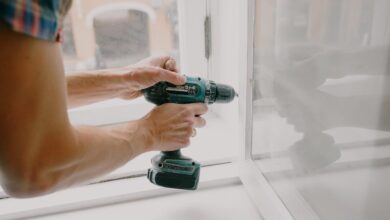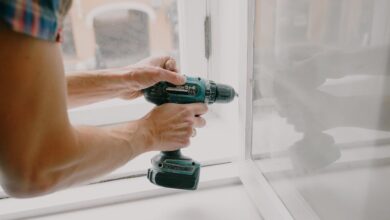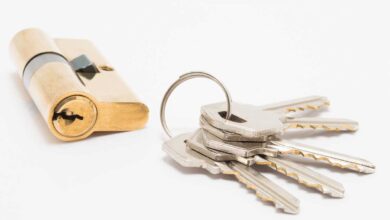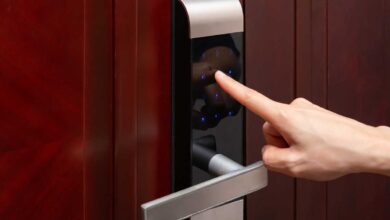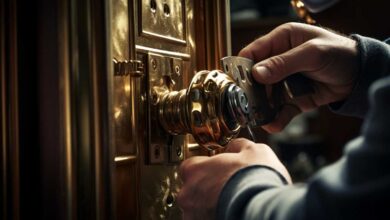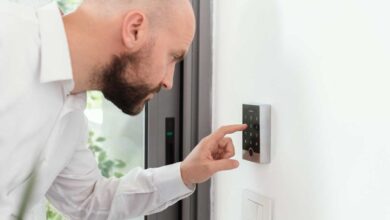Cost Considerations For Home Lock Repair
KEY TAKEAWAYS
Ensuring the security of your home often means addressing lock issues promptly. But how much should you budget for home lock repair? As with many services, the costs can vary. This guide delves into the key cost considerations, helping you understand what factors influence the price and how to make an informed decision when securing your sanctuary.
Home Lock Repair
Home lock repair rectifies malfunctioning or damaged locks in residential settings, which is essential for overall security. Lock failures or damages can arise from wear and tear, broken keys, malfunctions, or break-in attempts. Immediate attention ensures the home remains safe.
Cost considerations include:
-
Type of Lock: Residential locks vary, from traditional key locks and deadbolts to electronic and smart locks. Complexity and security level dictate repair costs.
-
Labor: Professional locksmith fees vary based on expertise and experience.
-
Time and Materials: Some fixes are quick, others extensive. Costs may include replacement components, such as cylinders or strike plates.
-
Quality of Locks: High-end or high-security locks cost more but provide increased protection. Homeowners must balance desired security against costs.
Always consult a reputable locksmith for accurate estimates.
Benefits of Home Lock Repair
Repairing home locks bolsters security, making it harder for burglars to gain unauthorized access and offering homeowners peace of mind. Repairs can also be more convenient and cost-effective than full replacements.
Enhanced security can be achieved through upgrades during repair, including high-security or smart locks. Moreover, well-maintained locks can enhance property value, appealing to potential buyers or renters. Prioritizing lock repairs ensures household safety and offers numerous advantages.
Types of Locks
1. Traditional Key Locks
The most basic lock type, traditional key locks, are affordable and user-friendly. While they provide decent security, they may be susceptible to picking or breaking.
2. Deadbolt Locks
Strong and durable, deadbolts are suitable for exterior doors due to their enhanced protection against forceful break-ins. Variations include single-cylinder (key from outside, thumb turn inside) and double-cylinder (key required on both sides). They might be slightly pricier than standard locks but offer significantly better security.
3. Electronic Locks
Merging technology with security, electronic locks offer keyless entry using keypads, fingerprint scanners, or apps. They come with features like remote access control and activity tracking. They’re convenient but might be pricier and need a power source to function.
4. Biometric Locks
Utilizing unique biological identifiers like fingerprints or retinal scans, biometric locks offer high security. They might be more expensive and may require specialized installation.
5. High-Security Locks
Ideal for those requiring advanced security, these locks feature drill-resistant plates and pick-resistant cylinders. Commonly used in commercial properties, they combine technology with robust materials for maximum protection.
6. Standard Lock (Pin Tumbler Locks)
Standard locks, available widely, consist of a cylinder with pins that align when the right key is inserted. Affordable and easy to install, they’re compatible with most door hardware. However, they might not be the most resistant to advanced break-in attempts.
7. Deadbolt Lock Considerations
Deadbolts, made with solid steel bolts, provide considerable resistance against forced entry. Prices can range based on quality and features. Proper installation, preferably by a locksmith, is crucial for optimal security.
8. Electronic Lock Considerations
Beyond their advanced features, electronic locks require electrical wiring, often necessitating professional installation. They might be vulnerable to hacking, so choosing a reputable brand and regular updates are essential.
9. Smart Door Locks
An evolution of electronic locks, smart door locks integrate with home automation systems and offer features like remote control and real-time notifications. They might be pricier but deliver high convenience and security levels.
In conclusion, the right lock for your home hinges on your specific security needs, budget, and personal preferences. Always consider consulting a professional locksmith for guidance tailored to your circumstances.
Hiring a Professional Locksmith
-
Traditional Key Locks: Basic and affordable, these locks are user-friendly but can be vulnerable to picking.
-
Deadbolt Locks: Durable with enhanced protection, they come in single and double-cylinder variations, offering superior security.
-
Electronic Locks: Featuring keyless entry via keypads or apps, they combine technology and security. However, they can be pricier.
-
Biometric Locks: Using fingerprints or retinal scans for access, they offer top-notch security but may be costlier.
-
High-Security Locks: Advanced locks typically used in commercial settings, providing maximum protection.
-
Standard Lock: Commonly used, affordable, but may be less resistant to break-ins.
-
Deadbolt Considerations: Strong and requires professional installation for optimal security.
-
Electronic Lock Insights: Requires wiring and updates, and choosing a trusted brand is crucial.
-
Smart Door Locks: Integrated with home systems, they offer high convenience and security but may be more expensive.
Researching the Company or Individual
When selecting a locksmith for home repairs:
-
Research: Begin with an online search to find local locksmiths, noting their services and customer reviews.
-
Website Check: Examine their website for qualifications, certifications, and specializations. If unsure, ask directly.
-
Experience: Opt for locksmiths with a proven track record and expertise in home lock repairs.
-
Insurance: Confirm they’re insured, protecting both parties during accidents.
-
Pricing: Gather quotes and be cautious of unusually low prices, which might hint at hidden fees or subpar service.
In-depth research ensures a dependable locksmith choice, safeguarding your home’s security and peace of mind.
Labor Charges for Service
When hiring a locksmith, be mindful of labor charges and associated fees. Charges vary based on job complexity, lock type, and expertise needed. While obtaining quotes from local locksmiths:
-
Avoid unusually low prices, which may suggest hidden fees or poor service.
-
Opt for transparent pricing with detailed breakdowns.
-
Be aware of extra fees like service charges for travel or higher rates for emergency or after-hours services.
-
Clarify payment methods and terms, understanding if deposits are required.
-
Don’t just focus on cost; consider experience, qualifications, and customer feedback.
Balancing quality service with fair pricing ensures trustworthy, reliable locksmith services.
Cost Considerations for Home Lock Repair
Locksmith costs vary based on complexity, lock type, and required expertise. Hourly rates are standard, with extra fees for parts or materials. To avoid overcharging or subpar service:
-
Gather multiple area quotes.
-
Beware of suspiciously low prices.
-
Choose locksmiths with transparent pricing.
Additional costs include service fees for travel or higher charges for emergency services. Discuss payment terms in advance: some locksmiths demand upfront payments, others upon completion.
Average Cost of Labor and Materials Per Job
Labor costs for lock repair can range from $100 to $250, influenced by lock type and security level. Material costs also differ: standard locks cost between $20 to $50, while advanced systems are pricier. Get multiple local estimates for an accurate cost. Beyond price, consider locksmith reputation and service quality.
Previous Owner and Current Locking System Used
After purchasing a new home, inspect, repair, or replace locks due to potential security threats from unretrieved key copies. The repair complexity depends on the pre-installed lock system. While some locks might only need minor fixes, consider upgrading if the system doesn’t match your security standards. Always consult a locksmith to gauge the security and condition of your home’s locks.
Replacement Locks and Strike Plate Installed
Home security hinges on the quality of the locks. With time, locks degrade, jeopardizing safety. It’s essential to replace worn or damaged locks and ensure the strike plate—a component bolstering the lock against forced entry—is intact. A misaligned or damaged strike plate makes break-ins easier.
If relocating, always replace locks, as unknown parties might have spare keys. When choosing replacements, consider door material and needed security levels; higher-crime areas may require advanced locks.
Entrust lock and strike plate installation to professional locksmiths for optimal security. Costs vary based on the lock type and installation complexity, so consult locksmiths for accurate quotes. Prioritize a robust lock system for utmost home safety.
Level of Security and Type of Lock System Needed
Securing your home hinges on choosing the right lock system tailored to your security needs. Consider factors like your home’s location and local crime rates. High-risk areas benefit from high-security locks, such as electronic systems with biometric or keypad features.
Deadbolts offer strong resistance against forced entry, making them reliable for exterior doors. While traditional locks can suffice, proper installation and fit are vital. Consult a professional locksmith for expert advice and accurate installation. Prices vary based on the lock type and installation complexity, so get a detailed quote from a trusted locksmith company. Prioritize a robust lock system, safeguarding your property and loved ones.
FAQs
1. What are the benefits of electronic lock systems over traditional locks?
Electronic locks often provide enhanced security features like biometric or keypad entry, making unauthorized access more difficult.
2. How often should I consider updating or replacing my locks?
Generally, whenever you move to a new home, experience a break-in, or if your locks show signs of wear.
3. Are deadbolts more secure than standard locks?
Deadbolts are designed to be more resistant to forced entry, making them a preferred choice for exterior doors.
4. Can I install high-security locks myself?
While possible, it’s recommended to have locks installed by a professional locksmith to ensure maximum security.
5. How do I determine the best lock system for my needs?
Consulting a professional locksmith will give insights tailored to your home’s location, structure, and personal security preferences.
Conclusion
Choosing the right lock system is crucial in ensuring home safety. With diverse options available, from electronic systems to traditional deadbolts, one must assess their unique needs. Consulting a professional locksmith ensures expert advice and proper installation, granting homeowners peace of mind and robust security.
Are you looking for a commercial locksmith nearby? Read more about your options from our blogs at Security Forward.
